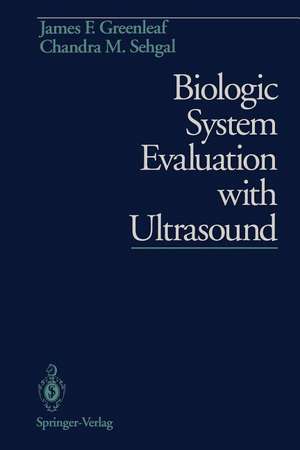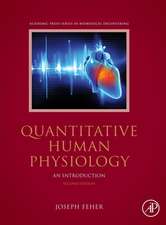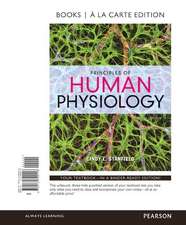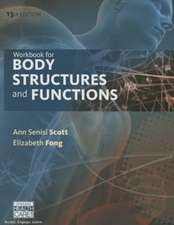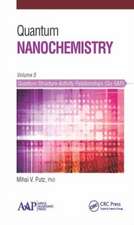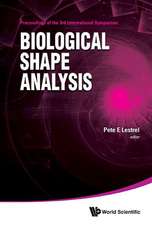Biologic System Evaluation with Ultrasound
Autor James F. Greenleaf, Chandra M. Sehgalen Limba Engleză Paperback – 8 noi 2011
Preț: 680.40 lei
Preț vechi: 716.21 lei
-5% Nou
Puncte Express: 1021
Preț estimativ în valută:
130.22€ • 137.38$ • 108.52£
130.22€ • 137.38$ • 108.52£
Carte tipărită la comandă
Livrare economică 02-16 ianuarie 25
Preluare comenzi: 021 569.72.76
Specificații
ISBN-13: 9781461392453
ISBN-10: 1461392454
Pagini: 140
Ilustrații: X, 127 p.
Dimensiuni: 155 x 235 x 7 mm
Greutate: 0.2 kg
Ediția:Softcover reprint of the original 1st ed. 1992
Editura: Springer
Colecția Springer
Locul publicării:New York, NY, United States
ISBN-10: 1461392454
Pagini: 140
Ilustrații: X, 127 p.
Dimensiuni: 155 x 235 x 7 mm
Greutate: 0.2 kg
Ediția:Softcover reprint of the original 1st ed. 1992
Editura: Springer
Colecția Springer
Locul publicării:New York, NY, United States
Public țintă
ResearchDescriere
Biologic System Evaluation with Ultrasound is a reference book for engineers in the field of ultrasonics and is intended to inform those unfamiliar with current methods of ultrasonic analysis. Explaining the mathematical and physical principles of ultrasound imaging of living tissue with effective precision, the book encompasses the following topics: relationships between the biological and scattering hierarchies; graphic description of scattering; class 1,2,3,4 scattering and their association with the biological hierarchy; instruments used for biologic system evaluation; computed tomographic methods of imaging. The authors have provided an effective explanation of the ultrasound scattering of image and image acquisition that will benefit engineers, physicists, and radiologists alike.
Cuprins
1 Scattering vs. Biologic Hierarchies.- 1.1 Introduction.- 1.2 Organization of Book.- 2 Biologic Material Hierarchy.- 2.1 Introduction.- 2.2 Molecules.- 2.3 Cells.- 2.4 Tissues.- 2.4.1 Inflammation.- 2.4.2 Fibrosis.- 2.4.3 Neoplasm.- 2.4.4 Other Diseases.- 2.5 Organs.- 2.6 Function (Organ Systems).- 2.6.1 Heart.- 2.6.2 Other Organs.- 2.7 Summary.- 3 Graphic Description of Scattering.- 3.1 Introduction.- 3.2 Wave Equation.- 3.3 Relationships Between the Fourier Transforms of P and Q.- 3.3.1 First-Order Approximations: Born and Rytov.- 3.3.2 Fourier Relationships.- 3.3.3 Orthogonal Incidence.- 3.3.4 Nonorthogonal Incidence.- 3.4 Inverse Diffraction Tomography.- 3.4.1 Backscattering Analysis.- 3.4.2 Echography.- 3.5 Transmission Tomography.- 3.6 Graphic Depiction of Scattering Classes.- 3.7 Discussion.- 4 Class 0 Scattering.- 4.1 Introduction.- 4.1.1 Molecular Interactions.- 4.1.2 Macroscopic Interactions.- 4.1.3 Tissues.- 4.2 Class 0 Scatterers.- 4.2.1 Absorption of Ultrasound.- 4.2.2 Sound Speed and Acoustic Nonlinearity (B/A).- 4.2.3 Conclusions.- 5 Class 1, 2, and 3 Scattering.- 5.1 Introduction.- 5.2 Model-Based Scatter Analysis.- 5.2.1 Signal Analysis.- 5.2.2 RF Analysis.- 5.2.3 Statistical Analysis of Envelope-Detected Signal.- 5.3 Texture-Based Scatter Analysis.- 5.3.1 Classification.- 5.3.2 Gray-Level Run-Length Texture Analysis.- 5.3.3 Markovian Statistics for Texture Analysis.- 6 Class 4 Scattering.- 6.1 Introduction.- 6.2 M-Mode Ultrasound.- 6.3 Doppler Methods.- 6.3.1 Various Techniques.- 6.3.2 Doppler Tracings.- 6.3.3 Doppler Color Flow Mapping.- 6.3.4 Color Doppler for Induced Motions.- 6.4 Correlation Methods for Measuring Motion.- 6.4.1 Speckle Tracking.- 6.4.2 Time Domain Correlation.- 6.5 Summary.- 7 Backscatter-Imaging Instruments.- 7.1 Introduction.- 7.2 Transducers.- 7.2.1 Piezoelectrics.- 7.2.2 Lenses.- 7.2.3 Construction.- 7.3 Beams.- 7.3.1 Lateral Resolution.- 7.3.2 Axial Resolution.- 7.3.3 Resolution Cell.- 7.4 Mechanical Scanning.- 7.5 Lensless Beamforming.- 7.5.1 Phased Array.- 7.5.2 Annular Array.- 7.5.3 Diffractionless Array.- 7.6 Effect of Scattering Class on Image.- 7.6.1 Class 0 Absorption and Speed.- 7.6.2 Class 1 Speckle.- 7.6.3 Class 2 Resolved Scatterers.- 7.6.4 Class 3 Specular Scatterers.- 7.6.5 Class 4 Motion.- 7.7 Conclusion.- 8 Computed Transverse Imaging.- 8.1 Computed Tomography.- 8.1.1 Reconstruction From Transmission Projections.- 8.1.2 Reconstruction From Reflections.- 8.2 Diffraction Tomography.- 8.3 Scattering-Class Comments.
